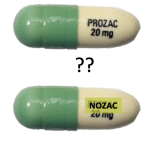The Fourth Turning and Complexity
Can a medication change our brain’s anatomy?
Are colonoscopies helpful?
Can the value of chicken soup be quantified?
antidepressants
We know stress can be dangerous, although treatment is not lacking. Pharmaceuticals abound, and more are in development. But reports are emerging that drugs may be addictive, they don’t work well in mild or moderate cases, and it's hard to wean off them. What’s a patient to do?
An important study examining whether antidepressants were useful for pain was recently published in BMJ. The headlines stated varieties of the same theme: They "may not be effective" or "may have a small benefit." These conclusions are based on data from one table in the paper. Let's take a look at that data.
A new video released by the magazine attempts to explain why there are more obese Americans today than 30-40 years ago. It claims that even if people eat healthy and exercise, it's easier to be obese today because of three factors -- but only one of those is likely to be correct.
It isn’t hard to imagine that as our enlarging and ever-stiffening polarized political spheres come to a head, an article about what maintains the penis’ potency might be a kind of crowning glory.
A look at several studies shows a significant association between several commonly-used antidepressants among children and teens, and increased suicidal thoughts and aggression. Even so, the reporting of such effects is sadly lacking in many areas, since they are usually under-reported.
What s a person to do, when on the one hand it s clear that many Americans are being under-treated for a dangerous condition, while on the other, too many of us are getting way too much care. The lesson: especially when it comes to our health, too much is as bad as too little.
The association between maternal use of antidepressants, especially selective serotonin reuptake inhibitors (SSRIs) during pregnancy, and birth defects in newborns and infants, has been the topic of much discussion in recent years. A new study, published in the BMJ, finds a small increased risk of two SSRIs (Paxil/paroxetine and Prozac/fluoxetine) with some birth defects, but not others (including the most commonly used SSRI,
Previous studies have suggested that pregnant women taking a commonly-prescribed class of antidepressants called selective serotonin reuptake inhibitors (SSRIs) late in pregnancy may be associated with an increased risk of persistent pulmonary hypertension of the newborn (PPHN). PPHN (also known as persistent fetal circulation) is a
n the always-uphill battle against depression a vicious and life-threatening disease that is typically caused by a malfunction of certain neurotransmitters or receptors in the brain any help is welcome.
In an article published in the Science section of the New York Times today, A Glut of Antidepressants, focuses on the high rates of antidepressants being prescribed




